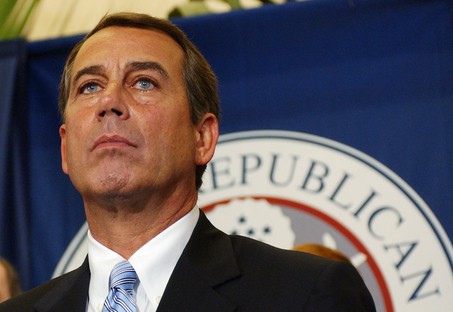 We watched House Speaker John Boehner’s news conference yesterday hoping to see signs that the voters’ clear message about their expectations for our nation’s fiscal future has finally been heard by GOP members of the House. Unfortunately, it’s clear nothing has changed. In fact, the Speaker has doubled-down on Republican demands that middle-class benefits in Social Security and Medicare must be cut to pay for tax reforms that will largely benefit the wealthy.
We watched House Speaker John Boehner’s news conference yesterday hoping to see signs that the voters’ clear message about their expectations for our nation’s fiscal future has finally been heard by GOP members of the House. Unfortunately, it’s clear nothing has changed. In fact, the Speaker has doubled-down on Republican demands that middle-class benefits in Social Security and Medicare must be cut to pay for tax reforms that will largely benefit the wealthy.
Firedog Lake has this terrific recap:
Boehner Opens Grand Bargain Negotiations By Proposing the Romney Plan
I touched on this yesterday, but let’s take a closer look at John Boehner’s opening offer on revenue, designed to avoid the fiscal slope (it’s not a cliff). I think it will become familiar to you if you look at the exact language.
For the purposes of forging a bipartisan agreement that begins to solve the problem, we’re willing to accept new revenue under the right conditions. What matters is where the increase revenue comes from and what type of reform comes with it. Does the increased revenue come from government taking a larger share of what the American people earn through higher taxe rates? Or does it come as a byproduct of growing our economy, energized by a simpler, cleaner, fairer tax code, with fewer loopholes and lower rates for all? And at the same time we’re reforming the tax code, are we supporting growth by taking concrete steps to put our country’s entitlement programs on a sounder financial footing or are we just going to continue to duck the matter of entitlements, thus the root of the problem?
So Boehner is calling for an across the board rate cut, paid for by (and actually with a revenue gain from) closing loopholes and deductions. All the while, he wants to “reform” entitlements to reduce the cost to government.
Now where have I heard that before? Oh yeah, it’s the Mitt Romney platform. The one defeated at the polls. Boehner’s opening bid is just the Romney tax plan, made even more ludicrous by the notion that you can increase revenue with it. Romney was widely mocked during the election for trying to make a large rate cut revenue-neutral; here Boehner wants to add to the fantasy world. He also alludes to the idea that lowering tax rates will increase economic growth and therefore tax receipts.
This is precisely the claim that was debunked by the Congressional Research Service study of 65 years of tax rates, which Republicans found so dissonant and offensive, they got the study torpedoed.Boehner’s lower-the-rates, broaden-the-base gambit has already been rejected by the likes of Chuck Schumer. He’s already blown up the tax reform con. And he got backed up by the Democratic leadership in the Senate. So if it comes back, we know exactly where it came from – the White House.
And this from Think Progress:
Like Romney, Boehner cited the Reagan 1986 tax reform — which included lowering rates and closing loopholes — as proof that his vision of boosting growth (and thus raising revenue) through tax reform is possible. But as Reagan administration economist Bruce Bartlett has noted, the 1986 reform didn’t actually result economic growth: “Real gross domestic product growth was about the same after the 1986 act took effect in 1987 as it was before…By the mid-1990s, it was the consensus view of economists that the Tax Reform Act of 1986 had little, if any, impact on growth.” Other studies came to the same conclusion.
It is theoretically possible to close enough loopholes and deductions to raise revenue in a tax reform package. But Boehner’s insistence that tax reform will cause growth that raises significant revenue is a conservative fantasy. This is the same game Republicans, including Boehner, have played since Obama came into office: promising that they’re open to revenue, so long as taxes never go up.
So that vote you cast on Tuesday? It appears Washington may just be pretending it didn’t happen.


